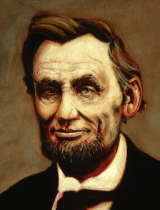
– preserving the Union, while ending slavery, and promoting economic and financial modernization.
1809 Abraham Lincoln is born in a one-room cabin in Kentucky
1832 Lincoln becomes a candidate in a failed bid for the Illinois General Assembly
1858 Abraham Lincoln delivers his House Divided speech in Springfield, Illinois.
1858 First of the Lincoln-Douglas debates in which Lincoln debates Stephen Douglas during a campaign for the U.S. Senate.
1860 Abraham Lincoln makes a speech at Cooper Union in the city of New York that is largely responsible for his election to the Presidency.
1860 Abraham Lincoln wins the Republican Party presidential nomination over William H. Seward, who later becomes the United States Secretary of State.
1861 President-elect Abraham Lincoln arrives secretly in Washington, D.C., after the thwarting of an alleged assassination plot in Baltimore, Maryland.
1861 President of the United States Abraham Lincoln suspends the writ of ''habeas corpus''.
1861 American Civil War: at the order of President Abraham Lincoln, Union troops begin a 25 mile march into Virginia for what will become The First Battle of Bull Run, the first major land battle of the war.
1861 U.S. President Abraham Lincoln suspends the writ of ''habeas corpus'' in Washington, D.C., for all military-related cases.
I have now come to the conclusion never again to think of marrying, and for this reason; I can never be satisfied with anyone who would be blockhead enough to have me.![]()
I believe it is an established maxim in morals that he who makes an assertion without knowing whether it is true or false, is guilty of falsehood; and the accidental truth of the assertion, does not justify or excuse him. ![]()
The true rule, in determining to embrace, or reject any thing, is not whether it have any evil in it; but whether it have more of evil, than of good. There are few things wholly evil, or wholly good. Almost every thing, especially of governmental policy, is an inseparable compound of the two; so that our best judgment of the preponderance between them is continually demanded.![]()
Determine that the thing can and shall be done, and then we shall find the way. ![]()
The way for a young man to rise, is to improve himself every way he can, never suspecting that any body wishes to hinder him.![]()
The better part of one's life consists of his friendships.![]()
The Autocrat of all the Russias will resign his crown, and proclaim his subjects free republicans sooner than will our American masters voluntarily give up their slaves.![]()

